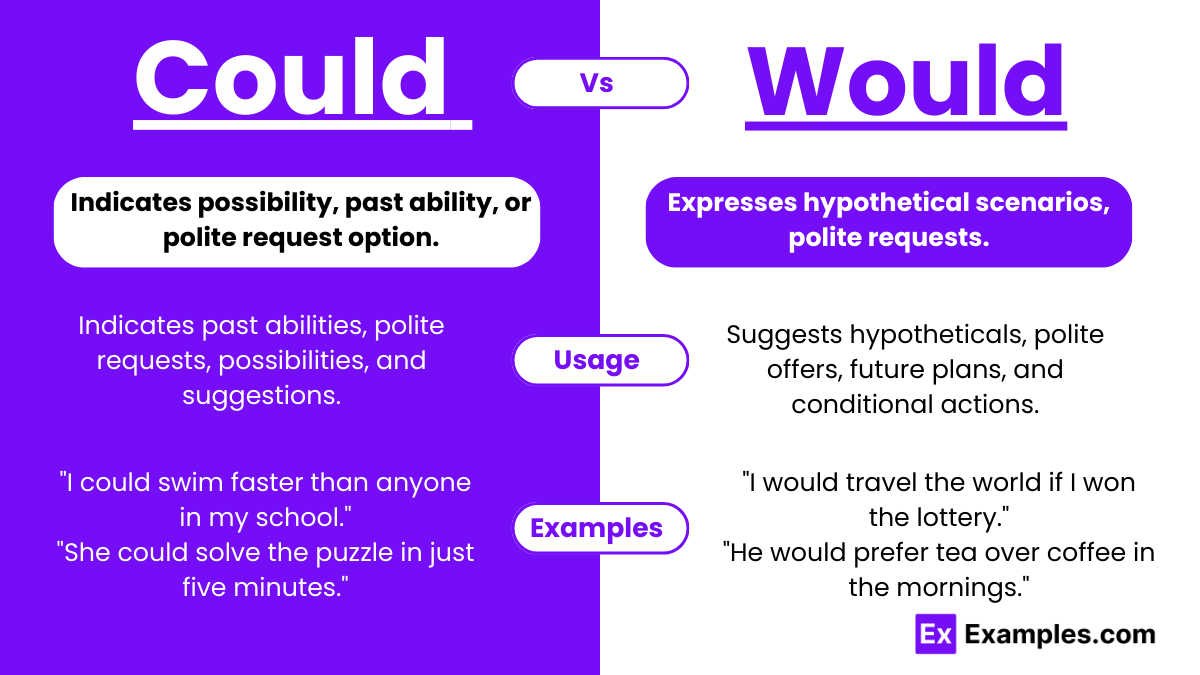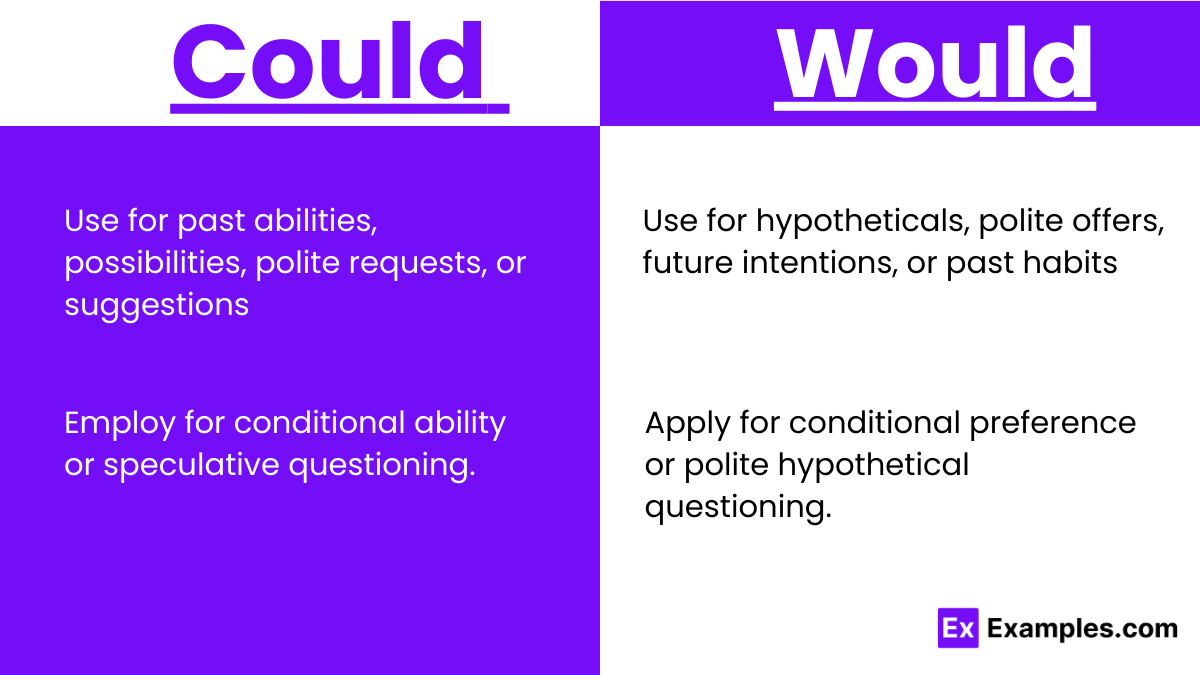Could vs Would
Diving into the realm of English modal verbs, “Could vs Would” presents a fascinating exploration of linguistic nuance and practical usage. This comprehensive guide, enriched with examples, illuminates the distinct meanings and contexts where each verb thrives. By unraveling their complexities, we empower language learners and enthusiasts to harness these verbs with confidence and precision. Within these pages, “words” become more than mere symbols; they transform into tools for crafting articulate, refined, and expressive communication.
Could vs Would – Meanings
Could: “Could” is a modal verb used to express possibility, ability in the past, or to make polite requests. It signifies something that was possible in the past or hypothetical situations that might occur, offering a way to suggest options or seek permission in a respectful manner.
Would: “Would” is a modal verb primarily used to describe hypothetical situations, express polite offers or requests. indicate future intentions based on past actions, or recount past habits. It conveys a degree of conditionality, used to speculate about what might or could happen under different circumstances
Summary
“Could” and “Would” are auxiliary verbs that express different nuances of possibility, ability, and hypothetical situations. “Could” often refers to past abilities or presents possibilities, while “Would” is used for hypothetical scenarios, polite requests, or future intentions viewed from the past. Grasping these verbs enriches communication, allowing for more precise expressions of possibilities, wishes, and polite suggestions.
How To Pronounce Could vs Would
- Start with “Could”:
- Begin by saying the “k” sound, keeping it soft.
- Move on to the “uh” sound, as in “book”. Your mouth should be slightly open and relaxed.
- End with the “ld” sound by lightly pressing the tip of your tongue against the back of your upper teeth and voicing out, though the “d” is very soft and almost silent.
- Moving to “Would”:
- Start with the “w” sound. Your lips should start rounded and close together, then slightly open as you prepare for the next sound.
- Follow with the “uh” sound, similar to “Could”, where your mouth is slightly open and relaxed.
- Conclude with the “ld” sound, just like in “Could”, but ensure the “d” sound is very soft, making the ending similar to “Could” but starting with a distinct “w” sound.
Remember, the difference in pronunciation between the two primarily lies in the initial sound—”k” for “Could” and “w” for “Would”. Both have a soft ending that blends the “l” and “d” sounds, making them similar in their conclusion. Practicing these sounds in front of a mirror or recording yourself can help in mastering their pronunciation.
Difference Between Could vs Would
| Aspect | Could | Would |
|---|---|---|
| Basic Usage | Expresses possibility, ability, or permission. | Expresses a conditional mood, wishes, or polite requests. |
| Time Reference | Often refers to past abilities or possibilities. | Primarily used for future hypotheticals or past habits. |
| Function | Can indicate capability or suggest an option. | Used to propose hypothetical scenarios or polite intentions. |
| Conditional Context | Used in conditional sentences to indicate possible outcomes. | Used in conditional sentences to express likely scenarios. |
| Permission | Can imply permission in a less direct way. | Rarely used for permission, more formal or hypothetical. |
| Requests | Less common for requests, can be used indirectly. | Commonly used for making polite requests. |
| Suggestions | Used for suggesting possibilities or options. | Used to suggest advice or preference softly. |
| Past Ability | Indicates an ability someone had in the past. | Not used to indicate past abilities. |
| Politeness | Can be polite but is less nuanced than “would”. | Often used to add a layer of politeness to requests or offers. |
| Hypotheticals | Used for scenarios that could possibly happen. | Used for scenarios that are more hypothetical or imagined |
Tricks to Remember Could vs Would
- C for Capability (Could for ability).
- W for Wishful (Would for wishes or hypotheticals).
- Use Could for past and possibility; Would for polite requests.
- Think of Could as Can’s past form; Would as Will’s polite form.
- Remember, Could has an “o” but sounds like “kud”; Would looks like “wood”.
- For possibilities, ask “Could it happen?” For hypotheticals, “Would it happen?”
- Could—Conditions; Would—Wishes.
- Use Could for questions about ability; Would for making offers.
- Would you like something? Use it for polite offers or requests.
- Can I? Yes, you Could. Will you? Yes, I Would.
When to Use Could and Would
When to Use Could
- To express ability in the past: “I could read when I was three.”
- For polite requests or offers: “Could you please open the window?”
- To suggest possibility: “We could go to the beach tomorrow.”
- For conditional statements: “If it rained, we could stay indoors.”
- Asking about capabilities: “Could she swim across the lake?”
When to Use Would
- For polite requests: “Would you like some tea?”
- To express a wish or desire: “I would love to visit Japan someday.”
- Hypothetical situations: “What would you do if you won the lottery?”
- Future in the past: “He said he would finish the work by today.”
- Conditional outcomes: “If I were you, I would apologize.”
How to Use Could and Would
How to Use Could
- Expressing Past Ability: “I could swim very fast when I was a child.”
- Suggesting Possibilities: “We could see a movie tonight.”
- Making Polite Requests: “Could you help me with this?”
- Conditional Situations: “If I had time, I could learn to play the guitar.”
- Offering Suggestions: “You could try calling customer service.”
How to Use Would
- Expressing Wishes or Desires: “I would love to visit New York.”
- Polite Requests or Offers: “Would you like some help with that?”
- Hypothetical Scenarios: “I would travel the world if I won the lottery.”
- Future in the Past: “She said she would call me.”
- Conditional Statements: “If I were you, I would not do that.”
Could and Would – Examples
Could – Examples
- Could you help me with this math problem?
- Asking for help in a polite way.
- I could swim very well when I was younger.
- Describing a past ability.
- We could see the movie tomorrow if you’re free.
- Suggesting a possible plan.
- She said she could finish the project by Monday.
- Indicating someone’s capability or potential action.
- Could there be another way to solve this issue?
- Speculating about other solutions.
Would – Examples
- Would you like some coffee?
- Offering something politely.
- I would go to the beach if it were sunny.
- Describing a hypothetical situation.
- When we were kids, we would play outside until dark.
- Talking about past habits.
- Would you mind closing the window?
- Making a polite request.
- She said she would help us tomorrow.
- Indicating a future intention based on a past discussion.
Exercise
Fill in the Blank with the Correct Form of “Could” and “Would”:
- If I had enough money, I ______ buy a new car.
- Last year, she ______ speak three languages fluently.
- ______ you like to join us for dinner tonight?
- When we were children, we ______ play hide and seek in the park every Saturday.
- ______ you help me move this table, please?
- I ______ have gone to the concert, but I decided to stay home.
- He said he ______ finish the work by tomorrow.
- We ______ see the mountains from our hotel room if the weather was clear.
- ______ you rather go skiing or snowboarding?
- She ______ not decide which dress to wear to the party.
Answers:
- would
- could
- Would
- would
- Could
- could
- would
- could
- Would
- could
FAQs
What is the main difference between “could” and “would”?
“Could” is used to express possibility or past ability, whereas “would” is often used to talk about hypothetical situations, polite requests, or future intentions based on past actions.
Can “could” and “would” be used interchangeably?
No, “could” and “would” serve different purposes in English grammar and are not interchangeable. Their usage depends on the context of the sentence, referring to abilities, possibilities, or hypothetical situations.
How do “could” and “would” work in conditional sentences?
In conditional sentences, “could” is used to suggest possible outcomes or abilities in conditional situations, while “would” is used to express actions or reactions that are more definite or likely in hypothetical scenarios.
Is it correct to use “would have” and “could have” for past events?
Yes. “Would have” is used to express a hypothetical outcome in the past, while “could have” indicates a past possibility or ability that was not realized.
Mastering the nuanced distinction between “could” and “would” empowers learners to articulate possibilities, abilities, and polite requests with precision and confidence. These auxiliary verbs, each with its unique applications, enrich our communication, allowing for more accurate and expressive dialogue. Understanding their differences is key to navigating the complexities of English, enhancing both spoken and written skills for effective and nuanced expression.




